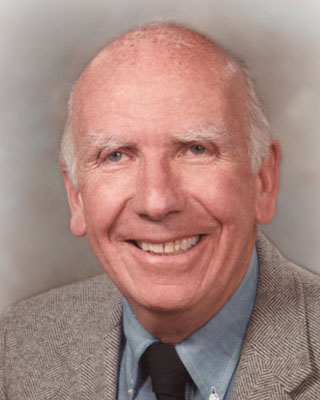by Gary Ernst, Professor Emeritus of Geology, Stanford University
Joanne, your wonderful family, and all Leon's friends:
When I joined the UCLA Geology (now ESS) faculty in 1960, during what I regard as the golden age of the Institute of Geophysics (now IGPP), Leon, a true Renaissance man, already had been there for 10 years, and was associated with such luminaries as Louie Slichter, Bill Libby, Dave Griggs, George Kennedy, Gordon McDonald, Willum Malkus, Bill Ruby, Bob Holzer, and very soon, George Wetherill, Bill Kaula, and Charlie Kennel. It was a heady time to be in the Earth sciences, what with the double-barreled revolution wrought by the understanding provided by the new global tectonics, and by the spectacular data coming from the remote and manned exploration of the solar system.
As you well know, Leon was an international leader in the theoretical and seismic exploration of planet Earth, ranging from California to the South Pole and the Alpine-Mediterranean realm – where he first recognized and described the low-velocity zone in the upper mantle – a lynchpin in the evolution of plate-tectonic theory. He accounted for the contrast in the slower spreading rates of continental versus oceanic plates as related to the deep keels beneath the continents, slowing their progress through the asthenosphere. He erected a theoretical framework explaining the double-couple model for earthquakes, pioneered pattern recognition in musicology as well as in earthquake frequencies, and elucidated the phenomena of self-organization and chaotic behavior in seismic systems. And there were many more groundbreaking works. Leon's scholarly and artistic accomplishments are legendary.
On a personal note, we were all privileged to have such a friend. For he was a warm human being, invariably greeting one with a broad, engaging smile and often a ready chuckle or laugh. His and Joanne's regular attendance at the American Philosophical Society meetings in Philadelphia happily accommodated his remarkably diverse scholarly interests. These sessions provided a cornucopia of intellectual discourses, as varied as investigations of the idiosyncratic craftsmanship of ancient Greek stone cutters, allowing the dating of buildings and monuments by archeologists, to the flavors of subatomic particles, and to the evolution of jurisprudence as practiced by various configurations of the Supreme Court. Charlotte and I had many happy meals with Leon and Joanne – as memorable for the wide-ranging, spirited discussions as with the food.
I used to wonder at Leon's breathtaking scholarly diversity and productivity (how did he do it all?) until one New Years Eve party held at George and Phyllis Wetherill's home. After dinner, Phyllis had arranged a series of clever games for all of us to play: pick-up-sticks, answer the riddle, throw a ping-pong ball through a tiny hoop, solve a logic problem, build a structure out of several ungainly blocks – that sort of thing. What the winner would actually receive was to be a surprise, and it proved to be anticlimactic anyway. Leon and Bill Kaula, as I remember, enthusiastically accepted the challenge, and began a good-natured but fiercely competitive race to see who could finish first and win the brass ring (or whatever). Dare I relate that each determinedly and consistently failed to observe the rules Phyllis had laid down? They ended up roaring with laughter – as did we more timid competitors, unceremoniously pushed aside in the heat of battle. To me this shows the intensity to excel that was at the core of this big-hearted person; it showed him as intensely human and thus loveable. His were not "feet of clay," but feet encased in sneakers that allowed a swifter rate of progress.
Leon's immensely positive impact on the physical sciences and musicology were unique; equally important, his warm friendship touched all of us. We will always hold him in our hearts.
 L E O N K N O P O F F ____________________________________________________________________________________________________________
L E O N K N O P O F F ____________________________________________________________________________________________________________